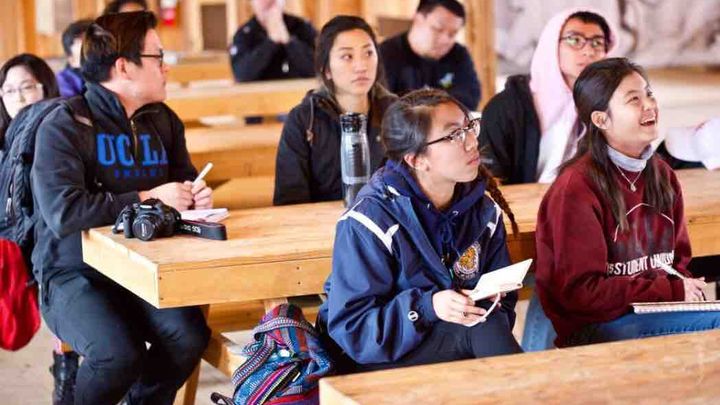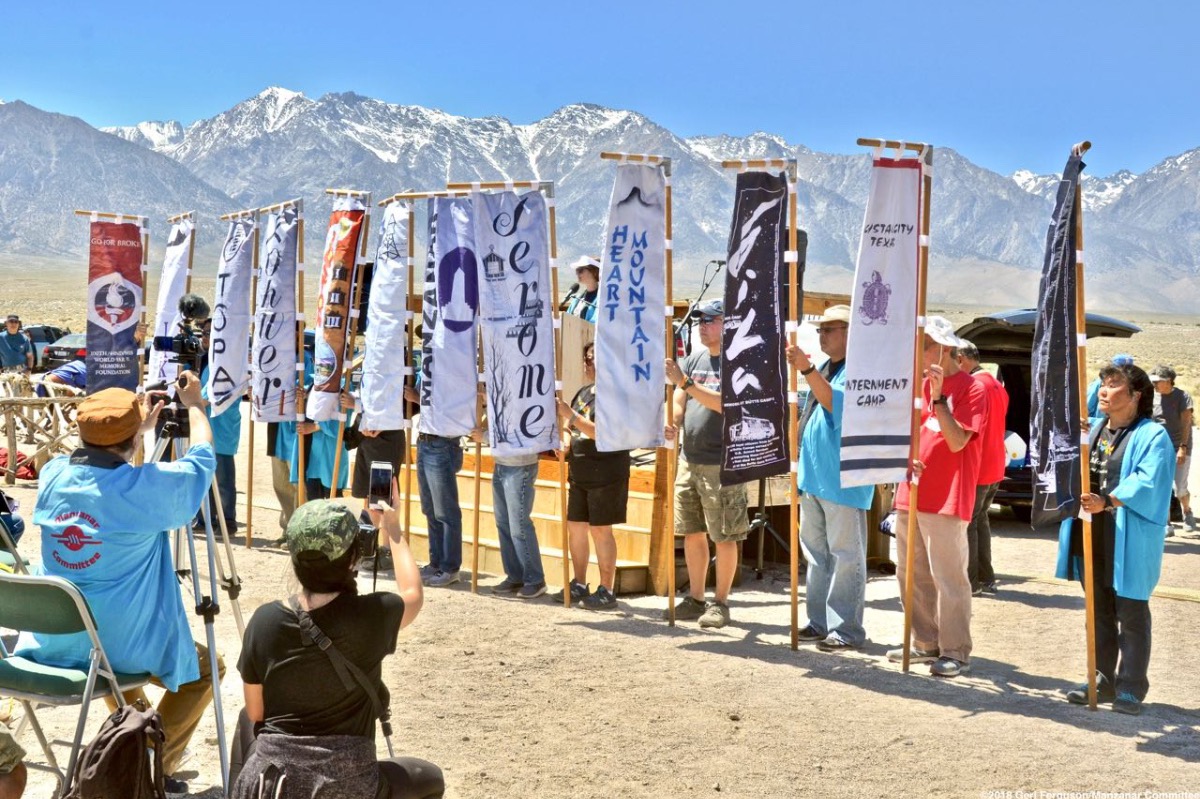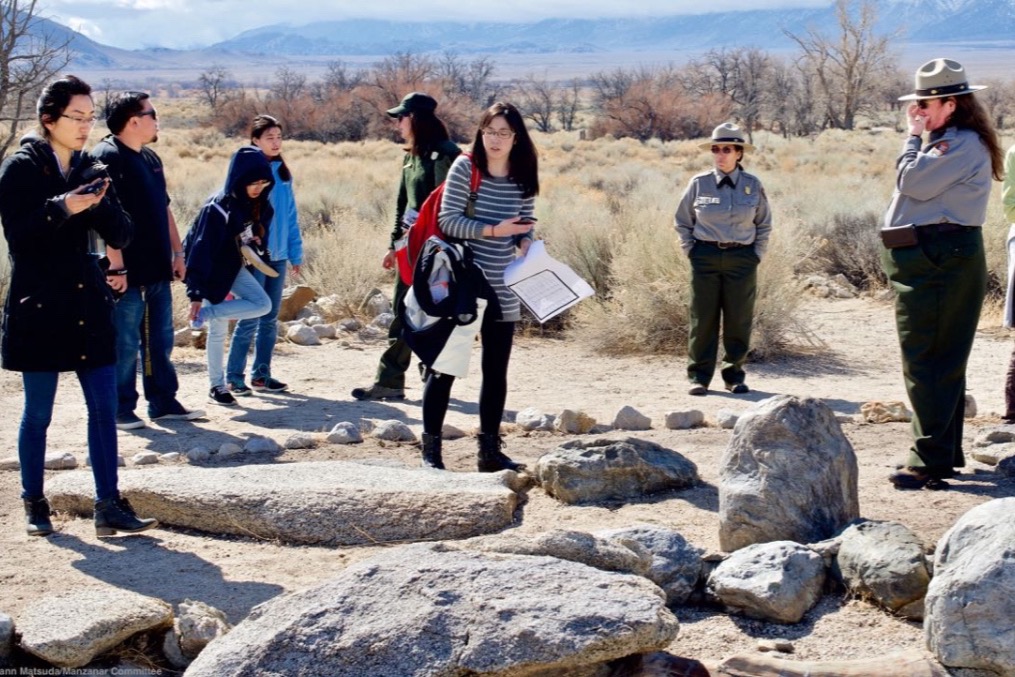
Katari: Keeping JA Stories Alive
Tax deductible
OUR PROPOSAL IN BRIEF
Last year, the Manzanar Committee , with multiple partners, launched a new project that took college-age youth to the Manzanar National Historic Site for two days of intensive, experiential, place-based learning about the unjust incarceration of over 120,000 Japanese and Japanese Americans during World War II. This project worked to bridge the generation gap that has made it much more difficult for young Japanese Americans to teach others about this history—teaching others about it is absolutely critical given the current political climate.
This year, we need your support to raise $5,300.00 to help defray the costs of lodging, meals, transportation and supplies for our students and other program participants.
BACKGROUND
Nearly 77 years ago, more than 120,000 Japanese and Japanese Americans were forcibly removed from their homes and communities on the West Coast and were incarcerated in ten American concentration camps, and other confinement sites. As a federal commission determined in the 1980s, this heinous, unjust act was the result of “race prejudice, war hysteria and a failure of political leadership.”
The first of the American concentration camps to be built was Manzanar, located approximately 230 miles northeast of Los Angeles, where 11,070 people were forced to endure painfully harsh conditions, many for more than three years.
To be sure, the incarceration of Japanese Americans during World War II was one of the most blatant violations of Constitutional rights in the history of the United States, a dark chapter of our nation’s history that must never be repeated—never again, to anyone, anywhere.

In December 1969, about 150 people, mostly Japanese American college students, made the first organized pilgrimage to Manzanar to pay tribute to their families who endured life behind the barbed wire. But perhaps more important, they made that journey to start filling in the blank pages in their history books—left blank because their parents and grandparents were so reticent to speak of their incarceration, still suffering from the pain and strong feelings of guilt and shame attached to this experience so many years later.
It didn't take long for the Manzanar Pilgrimage to become, not only a tradition, but a community institution. But by the mid-1990s, the time had come for the program to evolve in order to reach younger generations.
WHY IS THIS PROJECT NECESSARY?
In 1997, Japanese American college students helped start Manzanar After Dark, an interactive event where participants could hear the stories of those who were unjustly incarcerated at Manzanar, or other camps and confinement sites, straight from the mouths of those who experienced that injustice. Participants were also able to discuss what they learned, draw parallels to present-day issues, and talk about “what can we do now?”

Next April, the Manzanar Committee will hold its 50th Annual Manzanar Pilgrimage, marking 77 years, since the signing of Executive Order 9066, which resulted in the unjust incarceration of Japanese and Japanese Americans during World War II. 2019 will also mark the 27th anniversary of Manzanar being designated as a National Historic Site (March 3, 1992), and Manzanar After Dark, now known as Manzanar At Dusk, enters its 22nd year—it has become an integral part of the Pilgrimage weekend, promoting inter-generational and inter-ethnic discussions about the lasting impact of Japanese American Incarceration. Given the current political climate, this history is far more relevant today than we would like it to be, which places greater emphasis on the need to educate people about it.
Although these milestones are something to commemorate, they also clearly mark how much time has passed. Due to the shifting dynamics and demographics within the Japanese American community, including a growing recent immigrant population from Japan, and the previously mentioned younger generations, a large group of Japanese Americans are either two or three generations removed from the experiences of those who were forced to endure America’s concentration camps, or they have no connection to this history at all. As such, an increasing and alarming number of young people lack the knowledge and experience to be able to keep the stories of Japanese American incarcerees alive.
PROJECT DESCRIPTION

The Manzanar Committee, in partnership with the National Park Service staff at Manzanar National Historic Site, and the Nikkei Student Unions at California State University, Long Beach, California Polytechnic University, Pomona, the University of California, Los Angeles, and the University of California, San Diego (organizers of the Manzanar At Dusk program), sought to bridge these gaps by launching a pilot project with the working title, “Keeping Japanese American Incarceration Stories Alive.”
In Phase II, our pilot project continues with a short name of “Katari” (pronounced kah-tah-ree) which means “to tell stories” in Japanese) and a longer name that includes a sub-title: “Katari: Keeping Japanese American Stories Alive.”
As our first group of students did last March (see below), in Phase II, student organizers will spend the weekend of November 3-4, 2018 at the Manzanar National Historic Site, participating in intensive, place-based learning, training, and collaboration, not only giving them the opportunity to personally engage with Japanese American History, but they will also be provided with some of the tools needed to keep the stories of Japanese American incarcerees alive and to teach that history to others, which, as previously stated, is especially critical today, given the current political climate.
The students will also meet and collaborate with National Park Service staff at Manzanar—establishing relationships with those who care for our history is critical.
OUR PROGRESS

On March 10-11, 2018, this two-day experience took place for the first time, with a group of five college students from the UCLA and UCSD Nikkei Student Unions.
“My time in Manzanar, this time, was different. Intense and powerful,” said Lauren Matsumoto of the UCSD Nikkei Student Union. “I felt it was more impacting and meaningful...learning more about the history on the land where one of the camps stood. Students left the weekend, excited about how to take what they had learned back to their campuses to share with their organizations.”
This group of students came from very different backgrounds: some had families incarcerated, some were shin-Nisei, and non-Japanese, but they all brought with them passion and a willingness to learn. In a time where the numbers of those incarcerated are decreasing, it is becoming increasingly important to find ways to pass on their stories and connect to younger generations and our project successfully did that in its first iteration.
“As a shin-Nisei, I always felt out of place within the Japanese American community in Los Angeles,” said Moet Kurakata of the Nikkei Student Union at UCLA. “But this trip has made me realize that no matter what generation, age, skin color, or whatever form of identification, Manzanar is a place that impacts you as a member of society.”
Depending on how we meet our objectives in Year 2, we hope to expand this pilot project into a permanent, ongoing effort that will include a larger number of students at more college campuses in the future. As such, support for this project has greater potential, reaching beyond our current group of students.

YOUR SUPPORT IS CRITICAL
We estimate that this year’s program will cost approximately $5,300.00, covering food, lodging, travel from Southern California, and supplies. Your support will help us take a big step towards ensuring that the critically important stories of those who were unjustly incarcerated in America's concentration camps will live on, long after their own voices have gone silent.
For a detailed overview of our project, please go to: https://blog.manzanarcommittee.org/katari.
For a report on our first trip with our students (with photos), please click on: https://blog.manzanarcommittee.org/2018/04/02/kjaisa.
The Manzanar Committee, a 501c(3) non-profit organization, is dedicated to educating and raising public awareness about the incarceration and violation of civil rights of persons of Japanese ancestry during World War II and to the continuing struggle of all peoples when Constitutional rights are in danger. An all-volunteer organization that has sponsored the annual Manzanar Pilgrimage since 1969, along with other educational programs, the Manzanar Committee has also played a key role in the establishment and continued development of the Manzanar National Historic Site.
Organizer
Gann Matsuda
Organizer
Los Angeles, CA
Manzanar Committee
Registered nonprofit
Donations are typically 100% tax deductible in the US.


